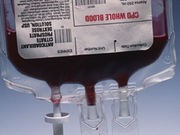

The U.S. Food and Drug Administration recommended on Friday that the nation’s entire blood supply be routinely screened for the Zika virus.
In February, the FDA recommended testing of donated blood and blood components only in areas where Zika was actively spreading, but agency officials now say that universal testing is needed to further protect those who get donated blood.
“There is still much uncertainty regarding the nature and extent of Zika virus transmission,” Dr. Peter Marks, director of the FDA’s Center for Biologics Evaluation and Research, said in an agency news release.
“At this time, the recommendation for testing the entire blood supply will help ensure that safe blood is available for all individuals who might need transfusion,” Marks added.
Donated blood is already being tested in Florida and Puerto Rico, as well as in other areas, FDA officials said Friday, and expanded testing should lower the risk of Zika spreading even further. The new recommendations will stay in place until the threat of Zika transmission is reduced, the agency added.
Dr. Luciana Borio, the FDA’s acting chief scientist, said, “As new scientific and epidemiological information regarding Zika virus has become available, it’s clear that additional precautionary measures are necessary.”
Zika is typically spread through the bite of the Aedes aegypti mosquito, but evidence has been accumulating that it can also be transmitted through sexual contact and blood transfusions, officials have said.
Back in February, the FDA also asked that people who had traveled to places where the Zika virus is prevalent, or who have symptoms that suggest infection, should wait a month before donating blood.
The mosquito-borne Zika virus has triggered an epidemic of birth defects that leave newborns with abnormally small heads and underdeveloped brains. Brazil has been the hardest hit, with thousands of infants born with this defect, known as microcephaly.
According to the FDA, people considered to be at risk for Zika include those who have:
- Traveled to areas with active transmission of Zika virus during the past four weeks.
- Engaged in sexual contact with a person who has traveled to, or resided in, an area with active Zika virus transmission during the prior three months.
- Developed symptoms suggestive of Zika virus infection during the past four weeks.
The risk of blood transmission is considered likely based on the most current scientific evidence of how Zika and similar viruses are spread, FDA officials have said.
About four out of five of those infected with Zika virus do not become ill, which makes it tough to determine whose blood might carry the pathogen, the agency noted.
The American Red Cross has also asked potential blood donors who have traveled to Zika-affected areas to wait 28 days before giving blood.
More information
For more about the Zika virus, head to the U.S. Centers for Disease Control and Prevention.
This Q & A will tell you what you need to know about Zika.
To see the CDC list of sites where Zika virus is active and may pose a threat to pregnant women, click here.
Source: HealthDay
Copyright © 2025 HealthDay. All rights reserved.

Leave a Reply